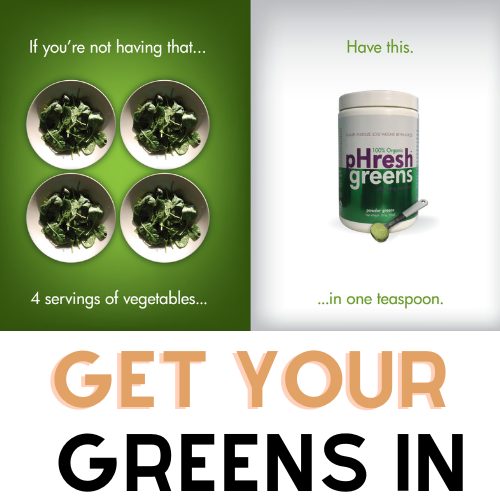You need to ensure you're getting all the nutrients you need to stay healthy. The best way to do this is to eat a wide selection of fruits, vegetables, nuts, seeds, whole grains, healthy proteins and healthy fats, including omega-3s.
When properly prepared, plant foods have a lot to offer, and they are all amazingly nutritious in their own way.
So, we have selected eight impressive plant foods that we think possess some sterling prowess in the nutrient-density stakes. They are most definitely up there with the crème de la crème.
1) Spirulina
An amazing superfood, spirulina is beyond healthy. This ancient blue/green freshwater microalgae has a whole lot to give and is truly wondrous.
A valuable food source of the Aztecs, spirulina is produced all over the world and is commonly used as a dietary supplement. It gains its nutrient density properties from the water in which it grows, so the better the environment, the more nutritious the spirulina.
Believe it or not, this little plant is around 60% protein and is also a ‘complete protein’ – meaning it contains all nine of the essential amino acids. It’s easily broken down in the stomach and is well absorbed.
Spirulina is also high in antioxidants and carotenoids that help to fight free radical damage and reduce inflammation, protecting you from chronic disease. It’s a great source of vitamins C and E, iron, and a host of B vitamins.
Spirulina is a heavy metal detoxifier. One 2006 study successfully treated chronic arsenic poisoning in a small group of Bangladeshi patients by supplementing with 250mg spirulina and 2mg zinc twice daily for 16 weeks.
It’s immune-modulating, and high antioxidant status is also linked to cancer prevention. Several in vitro studies have demonstrated spirulina’s ability to decrease cancer cell growth for many different cancer types, including colon and pancreatic cancers.
It could be suitable for prevention of oral cancer too. One trial involved Indian tobacco chewers with oral leukoplakia. After giving them 1g of spirulina every day for 12 months, 45% showed complete regression of lesions compared to the placebo group.
Add to this spirulina’s potential to improve candida, reduce blood pressure, lower cholesterol and boost energy and what’s not to like?
2) Kale
Let’s begin by saying that this delicious dark leafy green has a perfect ANDI score of 1000. What’s an ANDI score? Well, it’s the ranking of a wide assortment of plant foods on the ‘Aggregate Nutrient Density Index’ as created by Dr Fuhrman.
Kale is King and is overloaded with vitamins, minerals, antioxidants, fibre and other goodies. It’s exceptionally high in vitamin K, making it great for your bones and wound healing.
It’s also high in vitamin C and beta-carotene (which converts to vitamin A). Kale’s combination of vitamin A and the antioxidants lutein and zeaxanthin means that munching on its cruciferous leaves is excellent for your eyes.
Several studies show lutein and zeaxanthin can help to prevent macular degeneration and cataracts and that eating a diet high in these is great for your vision.
Related: Eye Health and Nutrition – How Diet Can Protect Your Vision
Cruciferous vegetables like kale are linked to cancer prevention. This is partly due to a group of substances called glucosinolates. These break down into biologically active compounds, including Indole-3-carbinol and sulforaphane, which have been researched for their anti-cancer effects.
Let’s not forget that kale also has enviable anti-inflammatory, detoxifying and heart-healthy properties too, so get chomping.
3) Spinach
Spinach also ranks pretty high on the ANDI index with a ‘not to be sniffed at’ score of 707. Another valuable addition to your plant-based repertoire, spinach is packed full of a range of vitamins, minerals and fibre.
It’s brimming with flavonoid antioxidants, essential nutrients, B and C vitamins, and is a fantastic source of vitamin K, magnesium, folate and iron.
Gently cooking your spinach releases and increases its nutritional yield, including the calcium which would otherwise be bound to oxalates.
Spinach joins kale with its anti-cancer properties. This is partly due to its ability to reduce free radical damage and also the fact that it contains glycoglycerolipids. It’s rich in nitrates which can help to lower blood pressure and has other heart-protective properties too.
Spinach is fibre-rich, helping to slow the release of blood sugar while keeping you feeling fuller for longer – helping to maintain a healthy weight and prevent diabetes. Its abundant antioxidant profile aids immunity, reduces inflammation and protects against chronic disease.
Spinach contains lutein and zeaxanthin to look after your vision, and with its prolific amount of vitamin K, it also supports bone health.
4) Brussels Sprouts
This brassica is very high in nutrients. Half a cup provides 2g of protein, high amounts of vitamins C and K, a range of B vitamins and minerals.
Like kale, Brussels sprouts also have anti-cancer properties due to their glucosinolates and isothiocyanates. According to researchers, consuming Brussels sprouts can help to prevent DNA damage and reduce oxidative stress in cancerous cells. They may also help to protect against colon cancer.
Loading up on these little balls of goodness could also reduce your risk of diabetes. This is because they are rich in alpha-lipoic acid, which can help to regulate glucose. The antioxidant effects of alpha-lipoic acid may also slow the development of diabetic complications, such as diabetic neuropathy.
Brussels sprouts’ high levels of vitamin C help to reduce inflammation and boost immunity, while its vitamin K keeps your bones healthy. The glucosinolates may also help to protect against cardiovascular disease, Alzheimer’s and Parkinson’s, and look after your gut.
5) Carrots
These popular root vegetables come in a variety of shades, including orange, purple, deep red, and yellow. They are high in antioxidants and several nutrients.
There’s some truth to the old wive’s tale about carrots helping you to see in the dark. They are exceptionally high in carotenoids which convert to vitamin A and protect your vision. Carrots also contain lutein and zeaxanthin, which aid your eyesight too.
Carrots are high in alpha and beta-carotene. Some studies, including a 10-year one involving older men in the Netherlands, have linked the consumption of carrots to a lower risk of death from cardiovascular disease. Drinking carrot juice may also protect against heart disease by increasing antioxidant levels and reducing oxidative stress and cell damage.
The beta-carotene and polyacetylenes in carrots are also linked to cancer prevention. In 2011, an in vitro study found that leukaemia cells treated with carrot juice extracts had increased cell death, and it halted cancer progression. Beta carotenes may also reduce the risk of breast, colon and lung cancer.
The high levels of antioxidant carotenoids, vitamin C and polyphenols in carrots all help to boost immunity, lower inflammation, fight free radical damage and protect against illness and disease. Beta-carotene in carrots may also protect the brain and aid cognitive function.
6) Berries
Berries are one of the best fruits around. They are high in anthocyanins and other antioxidants and are one of the richest sources of polyphenols.
Polyphenols are plant compounds such as flavonoids, phenolic acids and lignans that have a wealth of health benefits. They help to protect against oxidative stress and cell damage, improve insulin sensitivity and reduce the risk of type 2 diabetes.
A high flavonoid intake may also contribute to a lower BMI (body mass index), helping to maintain a healthy weight. Flavonoids decrease C-reactive protein, too, which can be an indicator of chronic inflammatory conditions.
The multiple compounds and nutrients found in berries have cardioprotective effects in both healthy and chronically ill people.
Strawberries, blueberries, raspberries, blackberries, sour cherries and blackcurrants are among some of the highest antioxidant-rich plant foods. Each different type of berry has its own unique nutrient profile and strengths.
For example, raspberries contain a host of nutrients including vitamins C, E and K, manganese, copper, biotin, folate and other B vitamins, potassium and fibre. Their high vitamin C and zeaxanthin content protect the eyes from UV damage and macular degeneration.
Blueberries and strawberries offer neuroprotective effects, safeguarding the brain. They are linked to slower rates of cognitive decline in the elderly.
7) Flaxseeds
These little seeds have been around for thousands of years and are bursting with goodness. Full of omega-3 fatty acids, flax seeds also provide a nutritious mix of minerals including selenium, manganese, magnesium, phosphorus, copper and zinc.
They also host folate, vitamin B6, iron and phosphate along with generous amounts of fibre and protein.
So it’s no surprise that a spoonful of flaxseeds every day can do you a world of good.
Omega-3 fats have all manner of health benefits. They feed your brain, improving alertness, concentration and cognitive function and can help to reduce the symptoms of depression and anxiety.
They can promote eye health, protect your heart, improve insulin resistance, fight inflammation and may aid ADHD and autism.
Related: 6 Foods High in Omega-3 and Why You Should Eat More
Flax seeds contain a prolific amount of lignans (considered to be 800-fold higher than any other food). These phytoestrogens have mild oestrogenic and non-oestrogenic effects.
Some studies support eating flax seeds for the easing of menopausal symptoms. In one pilot study, hot flashes improved in menopausal women who took 40g of crushed flaxseeds per day for five months. Lignans may even have the potential to regulate the menstrual cycle.
Lignans also have anti-cancer properties. They may reduce the risk of breast cancer, and in one study, patients with prostate cancer took 30g flax seeds per day and had significantly reduced tumour growth.
Linseeds provide both soluble and insoluble fibre and work wonders for your digestive system, keeping things moving and encouraging timely elimination of toxins. They are high in antioxidants and have immense anti-inflammatory properties.
Flaxseeds may also improve the symptoms of diabetes, can protect cardiovascular health and have the potential to lower blood pressure.
9) Turmeric
This member of the ginger family has been used as a spice since ancient times. Turmeric’s principal active ingredient is curcumin, and it also contains turmerones in its root.
Turmerones aid curcumin transport and enhance its availability and benefits. These antioxidants work collectively to reduce inflammation and sensitivity to pain.
Studies have shown the potential for turmeric /curcumin to relieve the inflammation and pain of arthritis. The antioxidants it provides help to protect your mitochondria from harm (the powerhouses of your cells) and also reduce free radical damage.
Curcumin may also help to guard against Alzheimer’s as it can help lower oxidative stress in the brain.
Turmeric isn’t used as a spice just because of its aromatic flavour and vibrant yellow colour, but also for its calming effects on the digestive system. It could also help in the treatment of ulcerative colitis.
Epidemiological studies have linked lower rates of cancers, notably large bowel cancers, in India to the heavy use of turmeric in the diet. Turmeric’s combination of curcuminoids and turmerones can halt the growth of breast cancer cells. Turmerones have also demonstrated an ability to stimulate the immune system.
The bottom line
The more nutrient-dense your diet, the more healthy you will be. Eating a diverse array of nutritious foods is the best way to protect yourself from illness and reduce your risk of chronic disease.
As demonstrated, there is an abundant selection of plant foods out there to provide you with many of the nutrients you need to stay healthy. Several are also a great source of healthy protein.
Some foods like spirulina, soybeans and quinoa form complete proteins which provide all the essential amino acids in one perfect package.
Plant foods also provide an abundant assortment of healthy fats, antioxidants, vitamins and minerals which all serve their own vital purpose in your body.
To get the best that plant foods have to offer, you need to eat a vast array of fruit, vegetables, nuts, seeds, beans, pulses and oils every day.




























Leave a comment